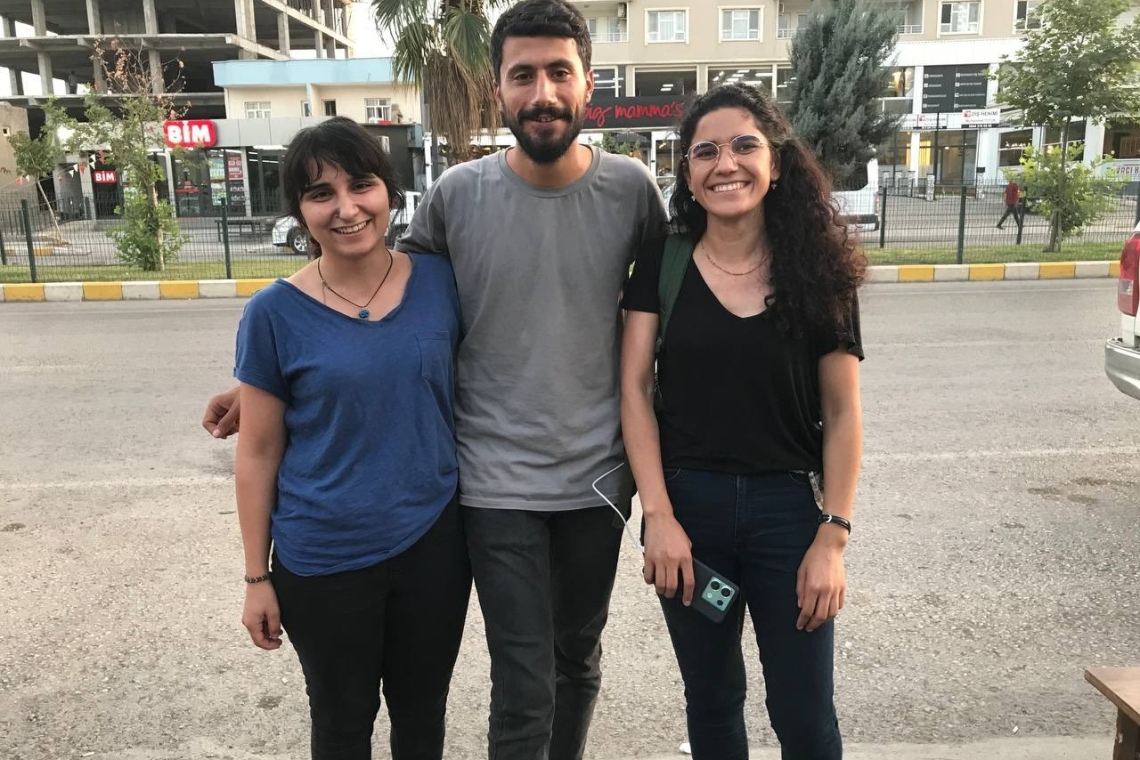DENİZ TEKİN
Journalists Zeynep Durgut, Derya Ren, and Mahmut Altıntaş, who were covering a protest in Şırnak’s Silopi district, reported being assaulted and detained by police despite identifying themselves as journalists. The reporters stated that their equipment was damaged during the incident and that they plan to file a criminal complaint against the officers responsible for preventing them from doing their job and for mistreating them.
The three journalists were covering a protest by members of the Peace Mothers Assembly on October 15, 2023, in Başverimli, a town near Silopi, calling for an end to war and demanding immediate peace. Police and military intervened, detaining 19 people, including the journalists, accusing them of "participating in an unauthorized demonstration." They were held in custody for one day before being released.
"I was threatened with handcuffing for filming"
Derya Ren, a reporter for JINNEWS, who was recently released from prison in August, described how the police were aware they were journalists, as they had shown their press cards when entering the area. She recounted, "As soon as the protest started, the crowd was attacked. I started filming as part of my job, but several times the police tried to take my camera. One officer even hit me on the head with my own camera. When I protested, he backed off, but I kept filming. A few minutes later, I was dragged on the ground and detained. They tried to confiscate my camera and cards, and once we were in the police vehicle, I was threatened with being handcuffed for filming."
Ren added that during a search, she asked the officer not to damage her camera or computer, only to be threatened again with, "I’ll crush you under my feet." Despite identifying herself as a journalist during questioning, Ren said she was repeatedly asked about her involvement in the protest, as if she were an activist. "They played nationalistic marches at high volume while we were in custody and then released us without taking our statements. Instead of releasing us at the courthouse, they drove us to Newroz Park, far outside of Silopi. This just shows how absurd and unlawful our detention was."
Ren highlighted the ongoing pressure on Kurdish journalists, explaining, "The police attacked mothers who were raising their voices for peace, and we were detained to prevent the coverage of those attacks. These pressures haven't stopped, even after my time in prison. But we will continue to report the truth despite these obstacles."
"I was beaten despite showing my press card, my camera and tripod were destroyed"
Mahmut Altıntaş, a reporter for Mezopotamya Agency (MA), noted that the police intervention specifically targeted journalists covering the protest. "The reason for our detention was to prevent this protest from reaching the public. We were singled out for arrest, despite showing our press cards. I was beaten by several officers, taking blows to my ribs and face. My camera was smashed after being thrown to the ground multiple times, and my tripod was also broken. They removed the memory card from my camera and deleted all the footage I had taken, rendering my camera inoperable."
Altıntaş explained that they had obtained medical reports documenting their injuries and plan to file a formal complaint. "In custody, we were asked ridiculous questions like, 'How did you hear about this protest?' and 'Why did you cover it?' I told them I was there as a journalist and that I would press charges against the officers who assaulted me and damaged my equipment. The repression against journalists, especially in Kurdistan, is intense, but we will continue doing our job and reporting the truth."
"You can’t ask a journalist why they are covering a story"
Zeynep Durgut, another MA reporter, was also assaulted and detained during a previous protest in Şırnak in 2023 and was later acquitted of charges under the law prohibiting unauthorized gatherings. She emphasized that journalists covering events organized by democratic groups in the region are regularly targeted because mainstream media outlets do not cover them. "Every time there’s a protest, we get arrested along with the participants because no other journalists are there to cover it. That's why we are easily singled out."
Durgut described the harsh treatment she endured during the police intervention: "I was assaulted by four or five male officers before being detained. They tried to take my camera, and when I resisted, they dragged me across the ground. Our cameras were broken during the attack. Despite knowing that we were journalists, we were repeatedly asked absurd questions, like 'Why were you there?' and 'Who told you about the protest?' You can’t ask a journalist why they are covering a story. These questions are an attempt to deny our role as journalists."
"We are constantly targeted because our reports have an impact"
Durgut stressed that the repression faced by Kurdish journalists is systematic, explaining that they are constantly targeted because their reporting raises awareness and makes people uncomfortable. "Our reports have an impact, and that's why we're always targeted. They can't make us submit, so they keep trying to beat us into submission, but it won’t work. We are determined to keep reporting the truth, and no amount of fines, arrests, or threats will stop us," she said.



